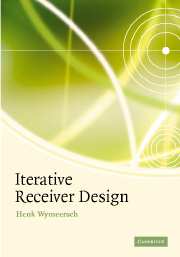Book contents
- Frontmatter
- Contents
- Preface
- Abbreviations
- Notations
- List of algorithms
- 1 Introduction
- 2 Digital communication
- 3 Estimation theory and Monte Carlo techniques
- 4 Factor graphs and the sum–product algorithm
- 5 Statistical inference using factor graphs
- 6 State-space models
- 7 Factor graphs in digital communication
- 8 Decoding
- 9 Demapping
- 10 Equalization–general formulation
- 11 Equalization: single-user, single-antenna communication
- 12 Equalization: multi-antenna communication
- 13 Equalization: multi-user communication
- 14 Synchronization and channel estimation
- 15 Appendices
- References
- Index
Preface
Published online by Cambridge University Press: 08 January 2010
- Frontmatter
- Contents
- Preface
- Abbreviations
- Notations
- List of algorithms
- 1 Introduction
- 2 Digital communication
- 3 Estimation theory and Monte Carlo techniques
- 4 Factor graphs and the sum–product algorithm
- 5 Statistical inference using factor graphs
- 6 State-space models
- 7 Factor graphs in digital communication
- 8 Decoding
- 9 Demapping
- 10 Equalization–general formulation
- 11 Equalization: single-user, single-antenna communication
- 12 Equalization: multi-antenna communication
- 13 Equalization: multi-user communication
- 14 Synchronization and channel estimation
- 15 Appendices
- References
- Index
Summary
In early 2002, I was absent-mindedly surfing the Internet, vaguely looking for a tutorial on turbo codes. My PhD advisor at Ghent University, Marc Moeneclaey, thought it wise for his new students to become familiar with these powerful error-correcting codes. Although I finally settled on W. E. Ryan's “A turbo code tutorial,” my search led me (serendipitously?) to the PhD thesis of NiclasWiberg. This thesis shows how to describe codes by means of a (factor) graph, and how to decode them by passing messages on this graph. Although interesting, the idea seemed a bit far-fetched, and I didn't fully appreciate or understand its significance. Nevertheless, Wiberg's thesis stayed in the back of my mind (or at least, I'd like to think so now).
During 2002 and 2003, I worked mainly on synchronization and estimation algorithms for turbo and LDPC codes. A colleague of mine, Justin Dauwels, who was at that time a PhD student of Andy Loeliger at the ETH in Zürich, had developed a remarkable synchronization algorithm for LDPC codes, based on Wiberg's factor graphs. Justin was interested in comparing his synchronization algorithm with ours, and became a visiting researcher in our lab for the first two months of 2004. I fondly remember many hours spent in the department lunchroom, with Justin (painstakingly) explaining the intricacies of factor graphs to me. His discussions motivated me to re-write my source code for decoding turbo and LDPC codes using the factor-graph framework.
- Type
- Chapter
- Information
- Iterative Receiver Design , pp. ix - xiiPublisher: Cambridge University PressPrint publication year: 2007
- 1
- Cited by



